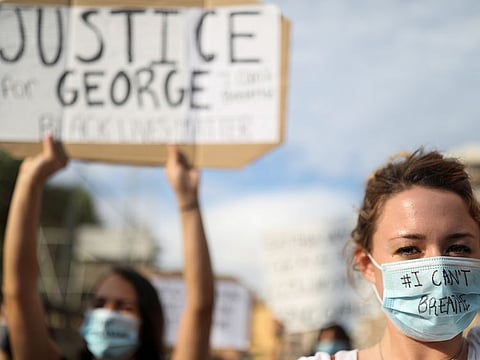George Floyd protests and the dirty secret of Indian and Pakistani communities
Rejecting oppressive treatment of minorities will be start in the fight against racism

In the week that has passed since he was brutally murdered by a police officer in Minneapolis, George Floyd has become an international symbol.
That so many around the world have been outraged by his killing at the hands of the merciless officer Derek Chauvin is a valuable step forward in the fight for racial equality.
Racial injustice is everyone’s problem, which means everyone has a role to play in solving this problem. For South Asians, this must start with confronting our sustained racism towards black people.
If Indians are truly outraged by the murder of George Floyd, they will take action and not just tweet hashtags. In India this means rejecting the destructive and oppressive treatment of its Muslim minority — particularly in the north
South Asians’ anti-black racism is now at the point where it is not even noticed any more; it’s so entrenched that it’s become part of the fabric of brown society.
As common as the head bobble
South Asia’s dirty secret is that sharing anti-black views carries no personal or professional penalties: it’s as commonly accepted as corruption and the famous head bobble.
Indeed, virtually all parents from the subcontinent view the notion of a black son-in-law or daughter-in-law as a source of shame. But the real shame is clinging to such an indefensible and clearly wrong attitude.
Despite many well documented cases of anti-black racism in India, South Asians appear to be making some progress on this front. For example, many South Asians who have expressed solidarity with the Black Lives Matter movement on social media.
This includes public figures such as Nick Jonas’ babysitter (whom you may know as Priyanka Chopra). America’s favourite token brown person may have lent support to an oppressed minority in her adopted country via an Instagram post but she continues to ignore the systemic oppression of minorities — Muslims and Dalits — in her homeland.
Also Read: Newsmaker: George Floyd — ‘I can’t breathe’
To be fair to Priyanka, at least she spoke up on Black Lives Matter. Which is more than Bollywood icon Shah Rukh Khan ever did. But we shouldn’t have any expectations from Shah Rukh Khan to see beyond himself.
After all, this is a man of incredible talent, wealth, influence and fame, who uses his platform to shamefully and reductively denigrate Muslims — an oppressed minority population in India — by producing Bard of Blood for Netflix.
I wonder how long it will be before an Apple engineer programs Siri to say Shah Rukh Khan when she is asked “what does sell out mean?”.
If this seems unfair, consider that America’s black celebrities — such as LeBron James and Jay-Z — routinely speak out when their community is targeted, but India’s Muslim celebrities — including Shah Rukh Khan — take selfies with Narendra Modi, a man who is Islamaphobic in policies not just rhetoric.
Tackling racist attitudes
Since cultural icons won’t use their influence to tackle racist attitudes, it falls to us: the people. If Indians are truly outraged by the murder of George Floyd, they will take action and not just tweet hashtags. In India this means rejecting the destructive and oppressive treatment of its Muslim minority — particularly in the north.
To truly honour the memory of George Floyd, Indians should demand justice for the Muslims killed by police officers during Delhi riots in January. To honour the memory of Ahmaud Arbery — the unarmed 25 year old who was killed by vigilantes while jogging — Indians should demand justice for the Muslims killed by cow vigilantes.
To honour the memory of Breonna Taylor — who was shot dead by Louisville police as she slept in her home three months ago, Indians should demand justice for Zaheer Ahmed who was similarly shot dead by police at his home this past December.
Of course, oppression of a minority population is by no means limited to India. In neighbouring Pakistan, Shiites, Sufis and Ahmadis are sometimes labelled as non-Muslim and are violently targeted by Pakistan’s Wahhabi vigilantes.
More troubling is the fact that Pakistani vigilantism has a disturbing cultlike following in the form of terrorist groups such as Sipah-e-Sahaba Pakistan, Tehrik-e-Taliban Pakistan and Lashkar-e-Jhangvi.
Bigotry and violence isn’t a black problem, a Muslim problem or a Shiite, Sufi or Ahmadi problem. It’s everyone’s problem. This only gets solved when everyone contributes towards a solution. And there’s no better place to start than confronting the racism in our communities, before it becomes more deadly.
Ali-Asghar Abedi is a writer based in New York. Twitter: @AbediAA
Sign up for the Daily Briefing
Get the latest news and updates straight to your inbox






